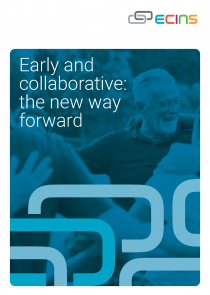by Gary Pettengell, CEO and Founder ECINS
I was recently talking to a Troubled Families lead who had been doing some engagement work with local schools. They had found to their surprise what an invaluable resource the schools were when it came to identify families in need. This reminded me about a Home Office funded project looking into multi-agency working and information sharing that reported that all areas surveyed said that IT issues could be a serious inhibitor to effective information sharing.
The study found, not surprisingly, that better information sharing across partners enables better safeguarding of the vulnerable, including children and young people.
Concerns which initially appear to be of a low level when seen in isolation, are sometimes recognised as part of a long standing pattern of abuse and neglect which needs a response when information is pooled together.
This finding is supported by case studies submitted to us by practitioners using ECINS.
Early feedback from a sample of 17 local areas found that the perceived outcomes of multi-agency working included:
- More robust decision making
- Less duplication of process across agencies
- An uptake in the use of early help assessments
- A reduction in repeat referrals
- Early interventions being put in place
- Improved engagement of health partners
- Reduced risk of border line cases ‘slipping through the net’
Despite the obvious benefits of multi-agency working, issues around effective information sharing are common place. These concerns quite often turn into barriers and include a misunderstanding among professionals about what client information can be shared, for example around confidentially. The report stated this was especially true among health professionals and could result in low confidence and uncertainty about what information can be shared.
This misunderstanding is not the fault of practitioners and is something managers, strategic leads and the government need to address especially around health. It needs addressing now because as well as reporting on this negative factor the same document stated that improved engagement of health partners had proved particularly valuable and beneficial across agencies, in helping to identify risks and facilitated early intervention.
I have sat in so many meetings where it is obvious that good engagement from health is very important as their information and/ or perspective is often crucial to effective decision making on risk assessments. Health care professionals seem more comfortable sharing information with other health care professionals and this confidence needs to be extended to other partners.
In many ways practitioners have been forced to think and work in silos as it has been very lucrative for IT companies to develop stand alone separate systems that do not talk to each other. As well as the obvious expense of working in this way there are other dangers. As stated above practitioners can become nervous about information sharing. There is also the danger of practitioners limiting their view of the world to just their job or team. They risk not seeing how what they do contributes to the rest of the work around a victim, offender or vulnerable person and there is a real risk of them not identifying risk and vulnerability. It isn’t hard to find evidence to substantiate this view. In just about every serous case review a lack of effective information sharing is cited as a contributing factor.
As a Social Enterprise we have made it our mission to put an end to ineffective and dangerous silo working by putting product before profit and by enabling all agencies from Health through to the Police and 3rd sector organisations to work together in one secure place.
In these times of austerity not for profit organisations might just hold the key to much more than financial savings – the non-commercial mindset might also provide a solution to overcome many of the concerns and barriers surrounding information sharing.


